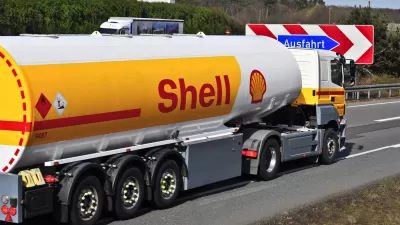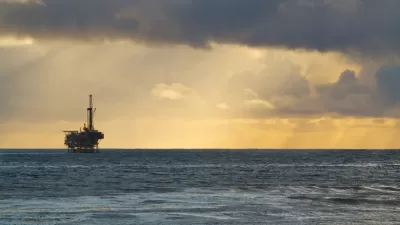Prime Minister Justin Trudeau is treading a fine line between supporting the economy of oil-sands dependent western Canada and fighting climate change, as impossible as that might sound. His efforts were rewarded by the energy industry.
Prime Minister Justin Trudeau was the keynote speaker at last week's CERAWeek energy conference in Houston, Texas, billed as "the premier annual international gathering of energy industry leaders, experts, government officials and policymakers, leaders from the technology, financial, and industrial communities."
Trudeau received "the CERAWeek Global Energy and Environment Leadership Award for his efforts to balance the economy with the environment in his government's policy prescriptions," reports Peter Zimonjic for CBC News.
At the end of the speech Trudeau received a standing ovation from the 1,200 people in the packed room, several of whom commented to CBC News that such a warm reception for a keynote speaker was out of the ordinary for the event.
The excerpt from his speech, widely highlighted by the media, may not have been received as well by his more progressive constituents in Canada as well as by environmentalists in other countries.
"No country would find 173 billion barrels of oil and just leave it in the ground," he said. "The resource will be developed. Our job is to ensure this is done responsibly, safely and sustainably."
Canada has the third largest proven reserves of oil after Venezuela and Saudi Arabia, however, most are in the form of oil sands, aka tar sands, widely considered the dirtiest form of oil, as they produce more greenhouse gas emissions than conventional oil when evaluated using a "full-fuel cycle" analysis. If any form of oil is meant to be "kept in the ground" to fight climate change, it would be oil sands, according to many in the environmental community.
Referencing a 1980s energy policy developed by his late father, Prime Minister Pierre Trudeau, and his predecessor, Stephen Harper, the 45-year-old leader of the Liberal Party said the "National Energy Program hurt both growth and jobs while the Conservatives failed to understand that the economy and climate change are linked," adds Zimonjic.
Touting his government's approval of new pipelines, and the Liberal's national plan to put a price on carbon, which were achieved at the same time, Trudeau said his government had achieved some good first steps at growing the economy and protecting the environment — but that more work still needs to be done.
Similarly, President Donald Trump has also approved controversial pipelines, but unlike Trudeau, both he and his environmental administrator question climate change. Rather than showing a willingness to improve the environment, Trump's commitment is to remove what he regards as burdensome regulations on industry.
FULL STORY: Trudeau says he will succeed on energy where his father and Stephen Harper failed

Maui's Vacation Rental Debate Turns Ugly
Verbal attacks, misinformation campaigns and fistfights plague a high-stakes debate to convert thousands of vacation rentals into long-term housing.

Planetizen Federal Action Tracker
A weekly monitor of how Trump’s orders and actions are impacting planners and planning in America.

In Urban Planning, AI Prompting Could be the New Design Thinking
Creativity has long been key to great urban design. What if we see AI as our new creative partner?

King County Supportive Housing Program Offers Hope for Unhoused Residents
The county is taking a ‘Housing First’ approach that prioritizes getting people into housing, then offering wraparound supportive services.

Researchers Use AI to Get Clearer Picture of US Housing
Analysts are using artificial intelligence to supercharge their research by allowing them to comb through data faster. Though these AI tools can be error prone, they save time and housing researchers are optimistic about the future.

Making Shared Micromobility More Inclusive
Cities and shared mobility system operators can do more to include people with disabilities in planning and operations, per a new report.
Urban Design for Planners 1: Software Tools
This six-course series explores essential urban design concepts using open source software and equips planners with the tools they need to participate fully in the urban design process.
Planning for Universal Design
Learn the tools for implementing Universal Design in planning regulations.
Appalachian Highlands Housing Partners
Gallatin County Department of Planning & Community Development
Heyer Gruel & Associates PA
Mpact (founded as Rail~Volution)
City of Camden Redevelopment Agency
City of Astoria
City of Portland
City of Laramie




























